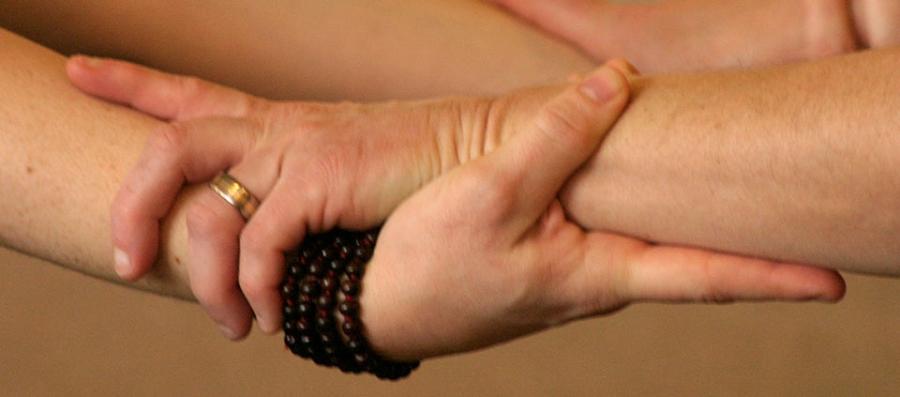Practicing Compassion—No Holds Barred

by Janet Arnold-Grych
We try to act with compassion and decency, to generally apply the tenets that form the Buddha’s Noble Eightfold Path of right view, intention, speech, action, livelihood, effort, mindfulness, and concentration. Some days, we are gloriously successful. Other days leave us shaking our head in disbelief. Still, we realize we choose our actions, and that those are the only actions we can control. So it would seem pretty straightforward to set our intention, choose our “right” action, and let the chips fall where they may. It is, of course, not that easy.
It’s not uncommon to find ourselves in situations in which our well-intentioned thoughts or actions feel in direct opposition to those of others. It’s almost as if they were using a completely different playbook. Maybe that situation involves a child’s disengaged teacher, a responsibility-shirking sibling, or a boss who is prone to label others’ work as her own. In these instances, to put a rational, compassionate appeal on the table and leave the outcome to manifest as it will feels wholly inadequate. How to avoid getting burned without losing our core of integrity?
If we’re looking for a pass on when it’s okay not to harness compassion, well, that’s not on the Path. In fact, the first course of action is to more firmly commit rather than make personal allowances. In this way, the actions we choose can better reinforce who we are seeking to become. “Start with recognizing and honoring your goal to live a life of compassion,” says Kripalu faculty member Izzy Lenihan, a certified life, career, and wellness coach. “Try to structure the way you live, the conversations you have, the relationships you develop, the activities you do, all to be in alignment with compassion. That’s how we become authentic.”
So we redouble our efforts to align our internal framework with our external actions, and that does give us greater grounding against everyday disturbances. But our grounding might not alter the fact that our sibling isn’t keeping his promises to get Mom to the doctor, or that our child’s teacher still isn’t making the accommodations requested. Having a compassionate core doesn’t mean we need to roll over. In fact, it can empower our resolve for action.
I am drawn to the image of Durga, the Hindu goddess often depicted as riding a tiger (a symbol of power and purpose) and wearing red (a symbol of action). Durga is all about battling evil and assisting us in battling our ego. The mace, trident, sword, and other sacred weapons in her many arms represent tools in her arsenal to advance righteousness—tools like detachment, selflessness, and knowledge. For me, Durga is an image that combines conviction, courage, and compassion. Those qualities are neither independent nor exclusive of each other. When it comes to standing in difficult situations, retaining that core of compassion can impact how we engage with others.
While we might wish desperately to “fight fire with fire,” the how of our response speaks directly to the maturity of our authenticity. “There are justifiable times to stand strong with our concerns,” says Izzy, “but how those concerns are delivered is the difference between choice and reactivity. Are you calling out someone’s personality or their behavior? Calling out personality is judgment and ego, but calling out behaviors can come from a place of compassion.” The upside is twofold. If we can stand our ground and deliver our truth from a place of grace, by addressing behavior and not personality, we have a much greater chance of our message being received.
Despite our compassionate actions, there will be times when the outcome we hope for simply doesn’t materialize. Izzy says those are wonderful times to pull aside a friend and rant and complain—and then let it all go and move on, authentically. In the end, compassion can’t come with guardrails. If we really want it to become part of who we are, we can’t justify taking it on and off the tracks depending on the situation. Rather, we need to double down on our commitment to it and courageously translate that compassion into action—and then yes, let the outcome go.
“Expressing compassion can bring clarity around our true essence and allow us to stand in that truth of ourselves,” says Izzy. Difficult? Of course. But, with each choice strengthening the next, we increase our ability to powerfully, persuasively, and compassionately create change in ourselves and, just maybe, in others, too.
Janet Arnold-Grych is a yoga teacher and writer whose work has been published in Elephant Journal, Huffington Post, Third Coast Digest, and other outlets. She’s also a marketing manager for a Fortune 200 company.
© Kripalu Center for Yoga & Health. All rights reserved. To request permission to reprint, please e-mail editor@kripalu.org.











































